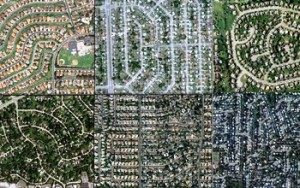
Among the most pressing global issues of the 21st century are the environmental challenges posed by urbanization and the differing ways people manage urban land. New research led by Clark University associate professor of geography Colin Polsky is aiding the scientific understanding of these practices and effects via a unique study of U.S. lawn care practices.
Polsky is the lead author on “Assessing the Homogenization of Urban Land Management with an Application to U.S. Residential Lawn Care,” a paper appearing in Proceedings of the National Academy of Sciences. This paper presents findings that land management practices associated with urban areas, specifically lawn care, display fewer similarities than expected nationwide. The research is funded by the National Science Foundation (NSF). For more about the grant, click here to read “Homogenization of Urban America: Becoming a single shade of green?”
* Read the just-released NSF news release about the research: Lawns across America: Is the US becoming one shade of green? *
“As our country transitions to urban sustainability planning, we need to know where a one-size-fits-all approach appears likely to work, and where it does not,” Polsky said. “Lawn care behaviors appear more varied than originally thought – place still matters for how people manage residential land. As such, responding to lawn care-related environmental challenges may require more locally-tailored solutions than originally thought. However, much additional research is needed before we can propose detailed successful management responses. For example, we need better measures of and explanations for the intensity of lawn care practices, as well as the biophysical outcomes of the practices.”

Clark University
Associate Professor of
Geography
Polsky and Clark Ph.D. students, in collaboration with researchers at 11 other institutions across the country, led by Dr. Peter Groffman at the Cary Institute of Ecosystem Studies, researched the idea that urbanization produces similar human behaviors regardless of local environmental conditions. This “Homogenization Hypothesis” was tested by examining survey responses from approximately 9500 urban residents in six cities. The authors tested for homogeneity of lawn irrigation and fertilizing both within each city in different types of neighborhoods, and across cities in the same type of neighborhoods. The results are clear: even though some lawn care patterns are observed in multiple places, there is less homogeneity than previously thought.
The research report is the first to offer nationally-representative findings to this application of sustainability science, according to the report.
As part of several inter-disciplinary teams, Polsky has received NSF grants totaling close to $18 million, of which $1.9 million has been directed to Clark University. He has also served as co-convening lead author for a chapter in the 2014 National Climate Assessment, served on National Research Council and U.S. Global Change Research Program committees, and prepared reviews for several Intergovernmental Panel on Climate Change (IPCC) reports.
Founded in 1887 in Worcester, Massachusetts, Clark University is a small, liberal arts-based research university addressing social and human imperatives on a global scale. Nationally renowned as a college that changes lives, Clark is emerging as a transformative force in higher education today. LEEP (Liberal Education and Effective Practice) is Clark’s pioneering model of education that combines a robust liberal arts curriculum with life-changing world and workplace experiences. Clark’s faculty and students work across boundaries to develop solutions to complex challenges in the natural sciences, psychology, geography, management, urban education, Holocaust and genocide studies, environmental studies, and international development and social change. The Clark educational experience embodies the University’s motto: Challenge convention. Change our world. www.clarku.edu


